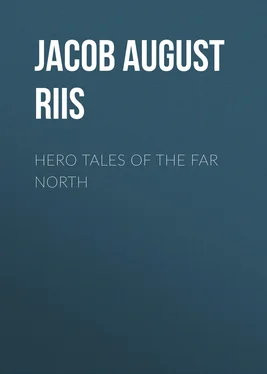Jacob August Riis - Hero Tales of the Far North
Здесь есть возможность читать онлайн «Jacob August Riis - Hero Tales of the Far North» — ознакомительный отрывок электронной книги совершенно бесплатно, а после прочтения отрывка купить полную версию. В некоторых случаях можно слушать аудио, скачать через торрент в формате fb2 и присутствует краткое содержание. Жанр: foreign_prose, История, foreign_edu, foreign_antique, на английском языке. Описание произведения, (предисловие) а так же отзывы посетителей доступны на портале библиотеки ЛибКат.
- Название:Hero Tales of the Far North
- Автор:
- Жанр:
- Год:неизвестен
- ISBN:нет данных
- Рейтинг книги:4 / 5. Голосов: 1
-
Избранное:Добавить в избранное
- Отзывы:
-
Ваша оценка:
- 80
- 1
- 2
- 3
- 4
- 5
Hero Tales of the Far North: краткое содержание, описание и аннотация
Предлагаем к чтению аннотацию, описание, краткое содержание или предисловие (зависит от того, что написал сам автор книги «Hero Tales of the Far North»). Если вы не нашли необходимую информацию о книге — напишите в комментариях, мы постараемся отыскать её.
Hero Tales of the Far North — читать онлайн ознакомительный отрывок
Ниже представлен текст книги, разбитый по страницам. Система сохранения места последней прочитанной страницы, позволяет с удобством читать онлайн бесплатно книгу «Hero Tales of the Far North», без необходимости каждый раз заново искать на чём Вы остановились. Поставьте закладку, и сможете в любой момент перейти на страницу, на которой закончили чтение.
Интервал:
Закладка:
Jacob A. Riis
Hero Tales of the Far North
FOREWORD
When a man knocks at Uncle Sam's gate, craving admission to his house, we ask him how much money he brings, lest he become a hindrance instead of a help. If now we were to ask what he brings, not only in his pocket, but in his mind and in his heart, this stranger, what ideals he owns, what company he kept in the country he left that shaped his hopes and ambitions,—might it not, if the answer were right, be a help to a better mutual understanding between host and guest? For the Mayflower did not hold all who in this world have battled for freedom of home, of hope, and of conscience. The struggle is bigger than that. Every land has its George Washington, its Kosciusko, its William Tell, its Garibaldi, its Kossuth, if there is but one that has a Joan d'Arc. What we want to know of the man is: were its heroes his?
This book is an attempt to ask and to answer that question for my own people, in a very small and simple way, it is true, but perhaps abler pens with more leisure than mine may follow the trail it has blazed. I should like to see some Swede write of the heroes of his noble, chivalrous people, whom lack of space has made me slight here, though I count them with my own. I should like to hear the epic of United Italy, of proud and freedom-loving Hungary, the swan-song of unhappy Poland, chanted to young America again and again, to help us all understand that we are kin in the things that really count, and help us pull together as we must if we are to make the most of our common country.
These were my—our—heroes, then. Every lad of Northern blood, whose heart is in the right place, loves them. And he need make no excuses for any of them. Nor has he need of bartering them for the great of his new home; they go very well together. It is partly for his sake I have set their stories down here. All too quickly he lets go his grip on them, on the new shore. Let him keep them and cherish them with the memories of the motherland. The immigrant America wants and needs is he who brings the best of the old home to the new, not he who threw it overboard on the voyage. In the great melting-pot it will tell its story for the good of us all.
To those who wonder that I have left the Saga era of the North untouched, I would say that I have preferred to deal here only with downright historic figures. For valuable aid rendered in insuring accuracy I am indebted to the services of Dr. P.A. Rydberg, Dr. J. Emile Blomén, Gustaf V. Lindner, and Professor Joakim Reinhard. My thanks are due likewise to many friends, Danes by birth like myself, who have helped me with the illustrations.
J. A. R.RICHMOND HILL,
June, 1910.
A KNIGHT ERRANT OF THE SEA
The Eighteenth Century broke upon a noisy family quarrel in the north of Europe. Charles the Twelfth of Sweden, the royal hotspur of all history, and Frederik of Denmark had fallen out. Like their people, they were first cousins, and therefore all the more bent on settling the old question which was the better man. After the fashion of the lion and the unicorn, they fought "all about the town," and, indeed, about every town that came in their way, now this and now that side having the best of it. On the sea, which was the more important because neither Swedes nor Danes could reach their fighting ground or keep up their armaments without command of the waterways, the victory rested finally with the Danes. And this was due almost wholly to one extraordinary figure, the like of which is scarce to be found in the annals of warfare, Peder Tordenskjold. Rising in ten brief years from the humblest place before the mast, a half-grown lad, to the rank of admiral, ennobled by his King and the idol of two nations, only to be assassinated on the "field of honor" at thirty, he seems the very incarnation of the stormy times of the Eleven Years' War, with which his sun rose and set; for the year in which peace was made also saw his death.
Peder Jansen Wessel was born on October 28, 1690, in the city of Trondhjem, Norway, which country in those days was united with Denmark under one king. His father was an alderman with eighteen children. Peder was the tenth of twelve wild boys. It is related that the father in sheer desperation once let make for him a pair of leathern breeches which he would not be able to tear. But the lad, not to be beaten so easily, sat on a grind-stone and had one of his school-fellows turn it till the seat was worn thin, a piece of bravado that probably cost him dear, for doubtless the exasperated father's stick found the attenuated spot.
Since he would have none of the school, his father had him apprenticed out to a tailor with the injunction not to spare the rod. But sitting cross-legged on a tailor's stool did not suit the lad, and he took it out of his master by snowballing him thoroughly one winter's day. Next a barber undertook to teach him his trade; but Peder ran away and was drifting about the streets when the King came to Norway. The boy saw the splendid uniforms and heard the story of the beautiful capital by the Öresund, with its palaces and great fighting ships. When the King departed, he was missing, and for a while there was peace in Trondhjem.
Down in Copenhagen the homeless lad was found wandering about by the King's chaplain, who, being himself a Norwegian, took him home and made him a household page. But the boy's wanderings had led him to the navy-yard, where he saw mid-shipmen of his own size at drill, and he could think of nothing else. When he should have been waiting at table he was down among the ships. For him there was ever but one way to any goal, the straight cut, and at fifteen he wrote to the King asking to be appointed a midshipman. "I am wearing away my life as a servant," he wrote. "I want to give it, and my blood, to the service of your Majesty, and I will serve you with all my might while I live!"
The navy had need of that kind of recruits, and the King saw to it that he was apprenticed at once. And that was the beginning of his strangely romantic career.
Three years he sailed before the mast and learned seamanship, while Charles was baiting the Muscovite and the North was resting on its arms. Then came Pultava and the Swedish King's crushing defeat. The storm-centre was transferred to the North again, and the war on the sea opened with a splendid deed, fit to appeal to any ardent young heart. At the battle in the Bay of Kjöge, the Dannebrog , commanded by Ivar Hvitfeldt, caught fire, and by its position exposed the Danish fleet to great danger. Hvitfeldt could do one of two things: save his own life and his men's by letting his ship drift before the wind and by his escape risking the rest of the fleet and losing the battle, or stay where he was to meet certain death. He chose the latter, anchored his vessel securely, and fought on until the ship was burned down to the water's edge and blew up with him and his five hundred men. Ivar Hvitfeldt's name is forever immortal in the history of his country. A few years ago they raised the wreck of the Dannebrog , fitly called after the Danish flag, and made of its guns a monument that stands on Langelinie, the beautiful shore road of Copenhagen.
Fired by such deeds, young Wessel implored the King, before he had yet worn out his first midshipman's jacket, to give him command of a frigate. He compromised on a small privateer, the Ormen , but with it he did such execution in Swedish waters and earned such renown as a dauntless sailor and a bold scout whose information about the enemy was always first and best, that before spring they gave him a frigate with eighteen guns and the emphatic warning "not to engage any enemy when he was not clearly the stronger." He immediately brought in a Swedish cruiser, the Alabama of those days, that had been the terror of the sea. In a naval battle in the Baltic soon after, he engaged with his little frigate two of the enemy's line-of-battle ships that were trying to get away, and only when a third came to help them did he retreat, so battered that he had to seek port to make repairs. Accused of violating his orders, his answer was prompt: "I promised your Majesty to do my best, and I did." King Frederik IV, himself a young and spirited man, made him a captain, jumping him over fifty odd older lieutenants, and gave him leave to war on the enemy as he saw fit.
Читать дальшеИнтервал:
Закладка:
Похожие книги на «Hero Tales of the Far North»
Представляем Вашему вниманию похожие книги на «Hero Tales of the Far North» списком для выбора. Мы отобрали схожую по названию и смыслу литературу в надежде предоставить читателям больше вариантов отыскать новые, интересные, ещё непрочитанные произведения.
Обсуждение, отзывы о книге «Hero Tales of the Far North» и просто собственные мнения читателей. Оставьте ваши комментарии, напишите, что Вы думаете о произведении, его смысле или главных героях. Укажите что конкретно понравилось, а что нет, и почему Вы так считаете.












